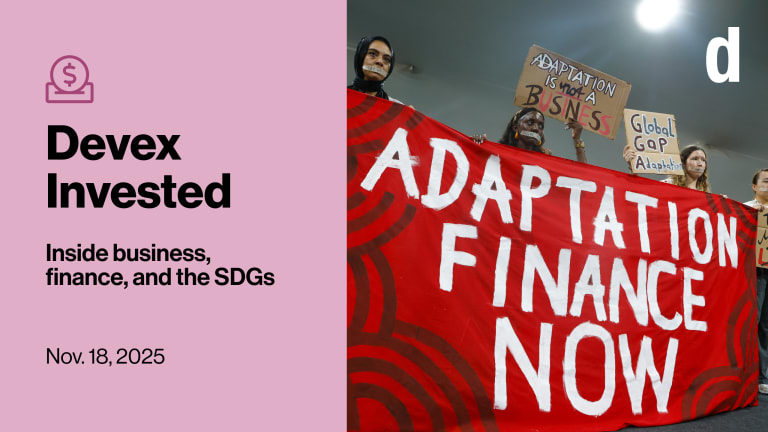
At the Paris Summit for a New Global Financing Pact in June, the message was clear: We need to revamp the global financial system to meet the challenges of the 21st century. To limit climate change and biodiversity loss, and to adapt to their impact, we need to transform our energy systems, industries, and lifestyles — but we also need a financing system that will sustain this transition adequately. The other message was that we cannot disentangle development, poverty reduction, and the fight against climate change and biodiversity loss.
Investment in climate and environmental action is far from the level it ought to be. That is especially true for the poorest and most vulnerable countries, where the capacity of governments to borrow and invest is constrained and increasingly hampered by rising interest rates. High-income countries, multilateral development banks, and other international financial institutions must live up to their responsibilities and commitments to direct financing and investment to these nations. They are the most exposed to the risks of climate change, even though they are the least responsible for the problem.
So, how should we revamp the global financial system?
Building resilience to climate-related disasters
We need to help low-income countries become more resilient to shocks. Natural disasters, which could push borrowers into distress, are set to become more frequent and more intense. When they occur, we need to leave room for the countries to deal with their consequences. During the Paris summit, the European Investment Bank announced its intention to offer debt deferrals — through so-called climate resilient debt clauses — in the finance contracts of the most vulnerable countries affected by climate and other natural hazards. This will be implemented through pilot projects in least developed countries and small island developing states. The EU bank is also looking to offer debt-for-nature or debt-for-climate swaps that could help countries lower their debt in return for nature conservation or climate action commitments.
We need to unblock the flow of private capital to accelerate climate-related and health investments. Multilateral development banks, such as the EIB, have a vital role to play here. We have tools to de-risk investments and encourage private sector involvement, but the contribution from private capital to the United Nations Sustainable Development Goals needs to be dramatically scaled up. For low-income and vulnerable countries to tackle the climate crisis and meet the SDGs, they will also need better access to long-term, low-cost loans. The EIB is prepared to help meet this need by offering longer tenor for its sovereign loans.
And, in a world wrecked by climate-related disasters, we need to find new ways of financing post-disaster reconstruction.
The Bridgetown Initiative, led by Barbados and vocally supported by many leaders in Paris, proposes urgent reforms to the global financial architecture to meet these objectives. It calls for a tripling of concessional loans and grants to the world’s poorest countries.
Engagement and partnership
At the Paris summit, progress was made on many of these complex issues, including on various ideas about how to boost the financial firepower and climate focus of multilateral development banks. But many proposals and details still need to be worked out.
Continued engagement at the highest political levels will be essential, but so is a spirit of partnership built on trust and respect. Partnership is at the core of the European Union’s approach to climate and development. The EU institutions and its member states work together in a “Team Europe” approach, which in turn collaborates on the ground closely with governments, institutions, and the private sector in partner countries. And it is also key to fostering coordination and collaboration at the global level. The new partnerships signed at the Paris summit demonstrate this approach. They include an agreement between the EIB and the overseas development agencies of France and Italy, as well as the International Finance Corporation, to mobilize an additional €300 million ($333 million) in support of Rwanda’s International Monetary Fund-backed climate resilience program. Additionally, there is a Just Energy Transition Partnership with Senegal signed by the EU — with a €300 million EIB contribution — France, Germany, the United Kingdom, and Canada. Regarding crisis-resilient primary health care services, the EIB is joining forces with the World Health Organization, the African Development Bank, the Inter-American Development Bank, and the Islamic Development Bank under the new Health Impact Investment Platform for low- and middle-income countries.

Radical thinking and new approaches
By some estimates, low- and middle-income countries (excluding China) need to invest $2.4 trillion a year on adapting to and mitigating climate change by 2030. While about half this amount can reasonably be expected to come from local sources, at least $1 trillion will need to come from external sources, such as high-income countries and investors. To meet these challenges, multilateral development banks and other development finance institutions will need to triple their lending in the next five years.
To turn the tide, however, radical thinking and new approaches will help. The EU’s Global Green Bond Initiative aims to mobilize capital from institutional investors to finance climate and environment projects by developing green bond markets. Backed by a €1 billion Team Europe and U.N. fund, which aims to mobilize $15 billion-20 billion over its lifetime, it is just one example of the kind of new thinking that is needed.
In the fight against climate change, we know that the longer we delay, the more difficult and expensive the challenges become. We need to accelerate and scale up our action, together, to promote sustainable development based on inclusive growth and alignment with the objectives of the Paris Agreement. The EIB is fully committed to doing its part in this collective endeavor.








